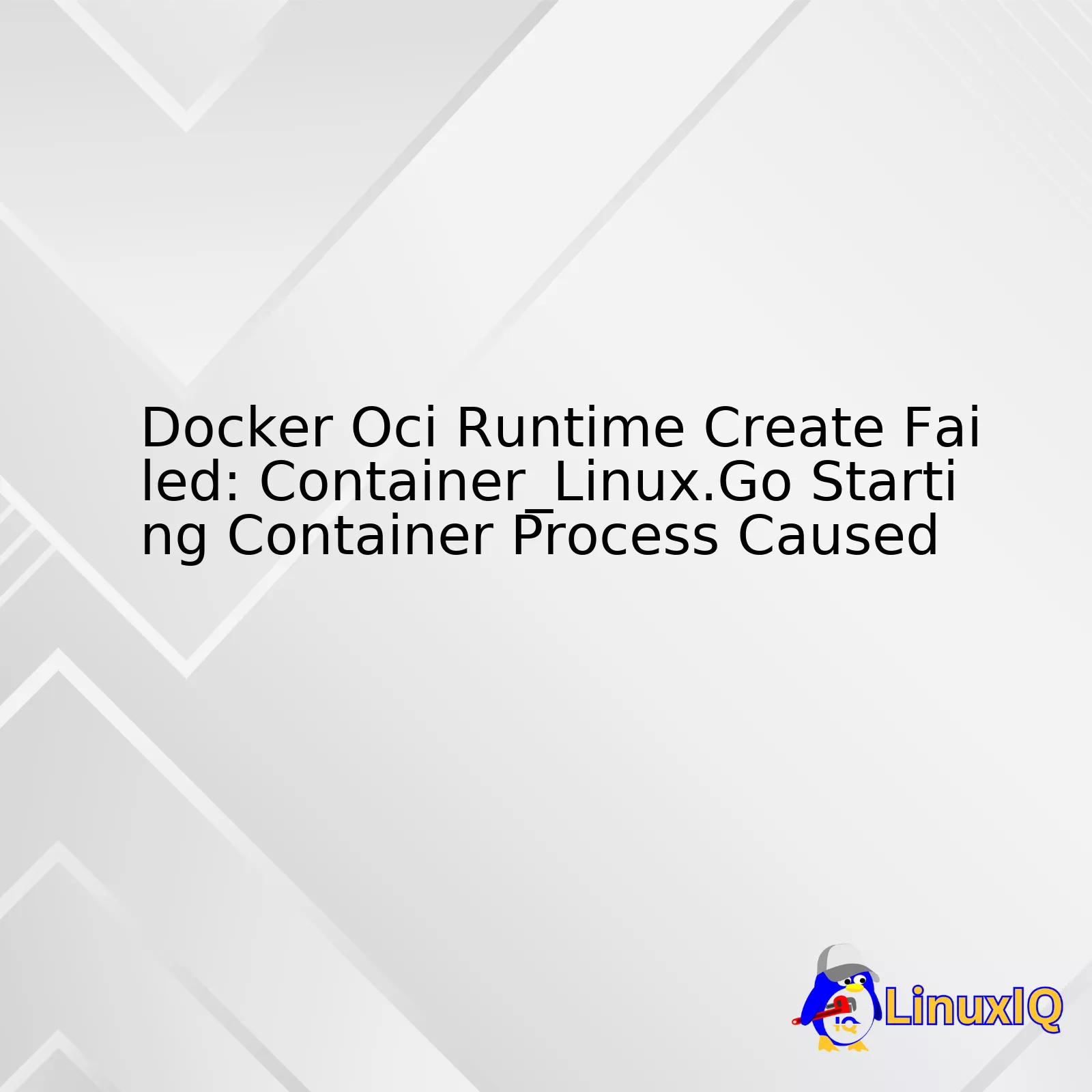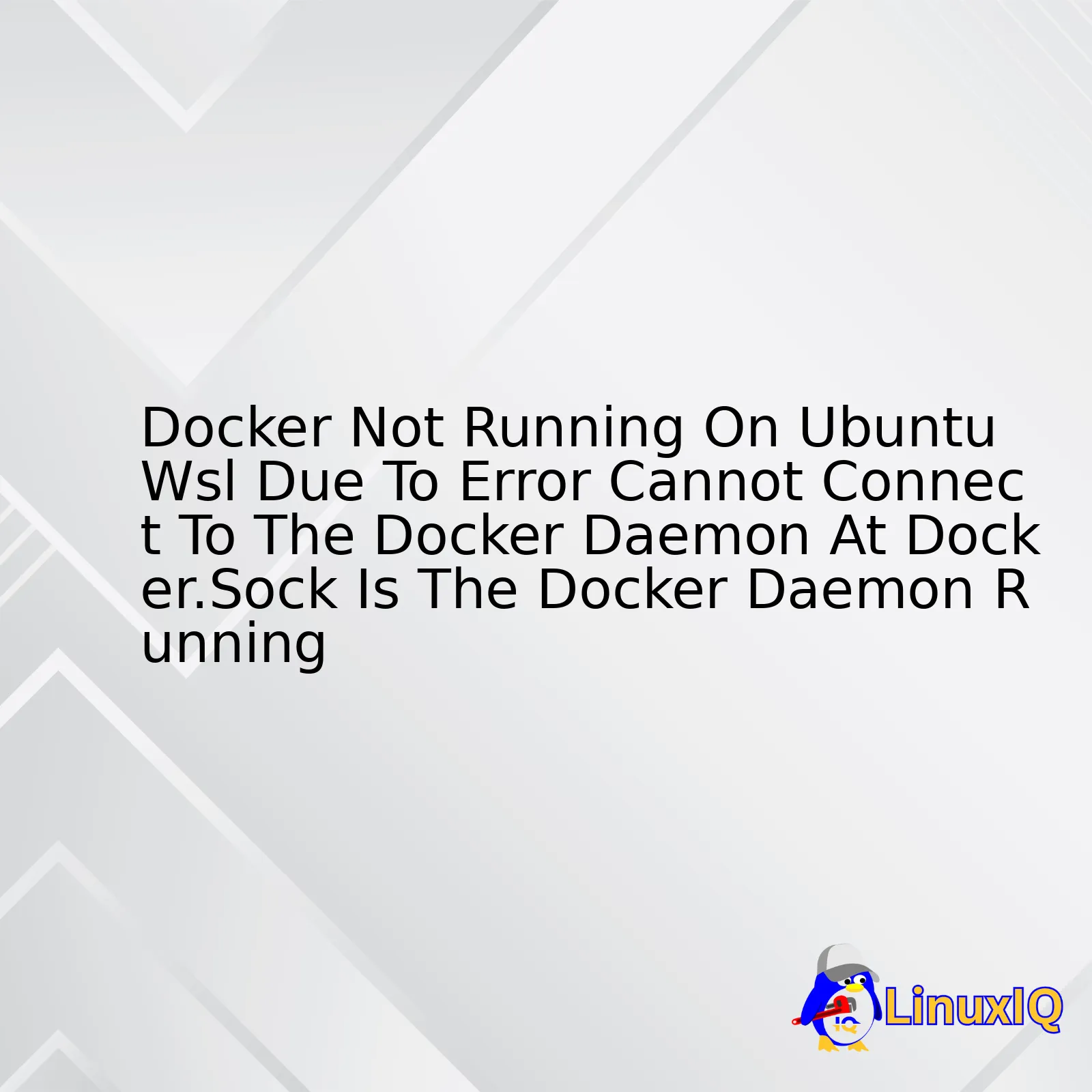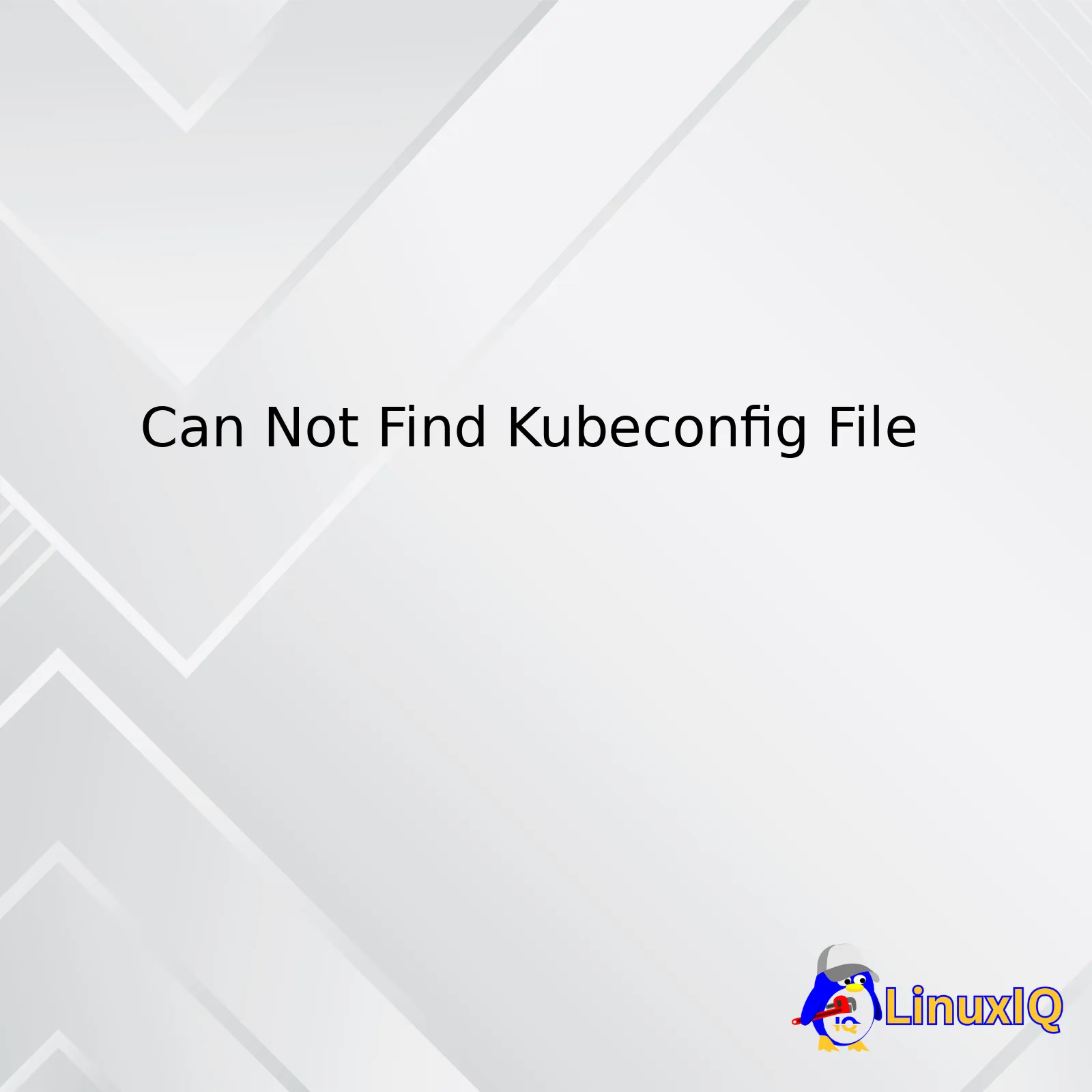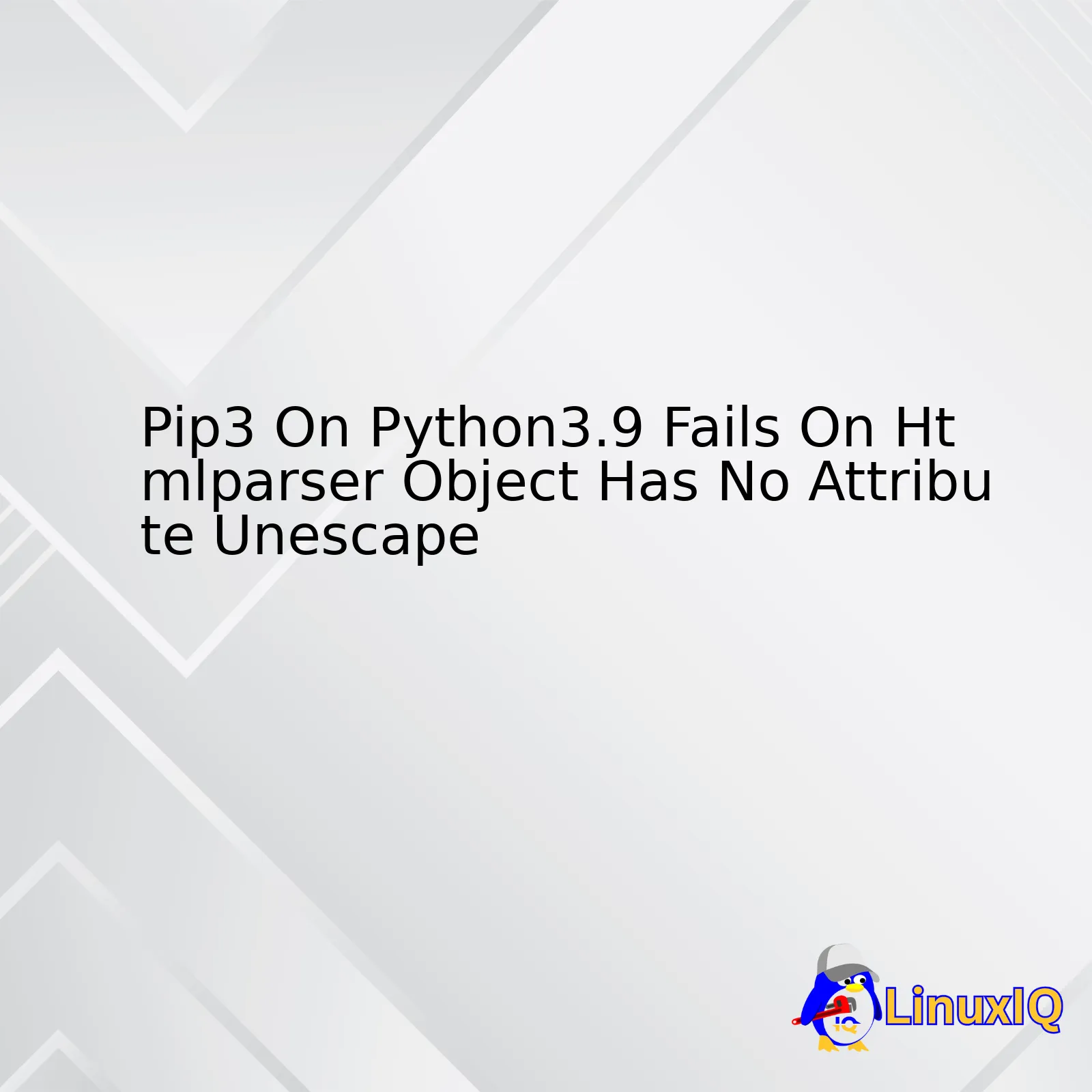
However, you may face several issues while creating a Docker container. An often encountered error message by users is “OCI runtime create failed: container_linux.go: starting container process caused”. This error often arises due to issues related to port mapping, image pulling or creation, syntax errors in Dockerfile, or directory and permission issues.
Now, here is an elaborative summary table on the issues:
| Error Causes | Possible Solutions |
|---|---|
| Port Mapping Issues | You must ensure that the port being mapped from the host to the container is not being utilized by another process or service. |
| Errors during Image Pull or Creation | Ensure the Dockerfile and build configurations are correct. Additionally, verifying network connectivity for repositories might help. |
| Syntax Errors in Dockerfile | Recheck the Dockerfile using linters or validating tools to spot and correct any syntax-related errors. |
| Directory And Permission Issues | Make sure to set appropriate file permissions and structure directories appropriately. |
When generating a Docker container using
docker run
command, and you encounter the “runtime error”, it may be due to one of these factors mentioned above. These solutions can help you guide your troubleshooting procedure to navigate around critical failures.
For example, if your problem is a syntax error in your Dockerfile, you would want to use linter tools such as Hadolint (source) which can help identify and correct the syntax related errors in your Dockerfiles. Here’s an example of how to lint your Dockerfile:
$ docker run --rm -i hadolint/hadolint < Dockerfile
This will provide you with a list of potential issues and their fixes, allowing you to refine your Dockerfile. Ensuring your container runs seamlessly involves a multiplicity of elements operating flawlessly together. When in doubt, always refer back to the official Docker documentation (source) for further assistance.
Docker is an open source platform that enables developers to automate the deployment, scaling, and management of applications through containerization. However, it's not uncommon to encounter errors when working with Docker - one such error that you might come across is "docker oci runtime create failed". Specifically, as per your query, let's delve into understanding the issue : "Docker OCI Runtime Create Failed: Container_Linux.Go Starting Container Process Caused".
First off, there's the term
OCI
, which stands for Open Container Initiative. The OCI develops specifications for standards on containers. When Docker mentions an OCI runtime error, this typically means that there's a problem going on while Docker is trying to create or start a container according to these standards.
Now with regard to the particulars of the aforementioned error, the cause can largely reside at two scenarios:
- The code in the Docker image might be causing the failure.
- There could be a system level issue such as insufficient resources or wrong configuration settings.
With regard to the first possibility, where the code within the Docker image could be resulting in the failure, some possible reasons include:
- The command from the Dockerfile ENTRYPOINT or CMD might fail due to its own issues.
- The application might try to perform actions for which the Docker environment is not prepared - such as GUI operations.
In the second scenario:
Coming back to its resource factor, a common example could be a scenario where a container requests more resources than are available on the system. Perhaps the most frequent situation involves requests for more memory than Docker can allocate. In such cases adjusting the resource allocation using the resources option in the Docker run command can rectify it:
docker run --memory=4g my-image
To thwart wrong configurations, ensure that Docker and all packages it depends upon are up to date and are certified to work together.
However to get into the specifics of the issue, diagnostic tools like Linux’s dmesg or Docker’s own logs can help – the command docker info can also reveal helpful information about your Docker installation.
Considering the complexity of software environments and diverse possibilities that could lead to this error, it's a first step identifying the potential sources of trouble. From there, it becomes easier then to derive specific solutions. Having good diagnostic practices and engaging many iterations on containers troubleshooting should help efficiently debug, providing a clear path to solve these kind of problems.
Remember even NextCloud had faced [a similar bug](https://github.com/nextcloud/docker/issues/380) wherein because of improper permissions during the build, it was leading to "Container_Linux.Go [...].Starting Container Process caused..." error. They found that setting the correct permission solved their issue.
To conclude, though our analysis here will help understand and troubleshoot generic scenarios related to "Docker OCI Runtime Create Failed" error, the exact solutions may vary greatly based on specific contexts each developer encounters. It therefore underscores the indispensability of gaining an in-depth familiarity with your own project requirements as well as aspects of Docker’s functionalities and limitations.
The 'Container_Linux.Go' Process Initiation Failure is a common Docker error that users may encounter when running containers. It often occurs when you attempt to start a new container with
docker run
command, and the Docker engine cannot execute it due to various reasons such as incorrect image configurations, incompatible host kernel versions, or file permission issues. The specific error message "
Docker oci runtime create failed: container_linux.go starting container process caused
" usually provides additional context to identify the root cause of the problem.
To troubleshoot the 'Container_Linux.Go' process initiation failure, you can take the following steps:
Firstly, inspect the detailed error message which is typically thrown along with the general error message 'Container_Linux.Go', it might indicate the specific issue that is causing your Docker process not to initiate properly. You can do this by adding an
--details
flag when running the Docker logs command as shown below:
docker logs --details CONTAINER_ID
Next, carefully check your Dockerfile setup. Are you specifying proper base images, validating file permissions, or passing correct set of arguments into your entrypoint scripts if any?
For instance, having an incorrect or non-existent command in your
ENTRYPOINT
instruction may result in the 'Container_Linux.Go' error. Take for example a line in your Dockerfile like this:
RUN non-existent-command
When building the image, Docker might not necessarily fail at this point (since Docker can't know whether the command exists or not until runtime), but when attempting to run the container, it will run into errors as it can't find the command that was specified.
Also consider checking whether there exist any compatibility issues. Are you trying to run an arm image on an x86 machine or vice versa? Docker generally attempts to pull the correct image for your architecture, but this process could sometimes fail and pull an image meant for another platform instead. In such cases, specifying the right platform with the
--platform
option during docker pull could help:
docker pull --platform linux/amd64 hello-world
If none of the above methods solve the issue, consult the official Docker documentation and community forums for additional insights. Remember to provide as much information about your setup as possible in your help request to get the most accurate responses from the Docker community.
Docker Oci Runtime Create Failed: Container_Linux.Go Starting Container Process Caused
The error message 'Starting container process caused' is a prevalent occurrence when setting up or running Docker containers. This issue generally originates due to improper configuration, inappropriate permissions, or incompatible versioning and holds significant implications in hindering the smooth deployment and execution of your applications using Docker.
Implications of 'Starting Container Process Caused'
1. Halts Application Deployment:
The most direct impact of this error is it prevents an application's proper deployment inside Docker. Your application could be an essential component of a larger system, hence getting the error stops the entire system from functioning as intended.
2. Inconsistent Service Availability:
Consistent availability is one crucial aspect of any application/system. Thus, the advent of this error leads to the unavailability of services offered by a specific Docker container, possibly disrupting critical business functionalities.
3. Prolonged Troubleshooting:
Diagnosing 'Starting container process caused' can sometimes be a daunting task and time-consuming as the root cause may lie in different areas – it can vary from file permissions to incorrect container configuration settings. Prolonged troubleshooting times may negatively impact development schedules and delivery timelines.
4. Security Concerns:
At times, developers might resort to set broad privileges (like chmod 777 for Unix-like systems), potentially opening up security vulnerabilities.
To understand the reasons behind this error, let’s consider a common scenario where this error often occurs, illustrating through code where suitable:
One common circumstance where you encounter this error is while trying to execute a shell script at the start of a Docker container, but the script lacks executing permission.
The Docker file might look something like this:
FROM ubuntu:latest ... COPY ./myscript.sh /usr/local/bin CMD ["/usr/local/bin/myscript.sh"]
Running this might throw the error if `myscript.sh` doesn't have necessary execution permissions. A potential solution would be to modify the Dockerfile to change the script's permissions before attempting to execute it:
FROM ubuntu:latest ... COPY ./myscript.sh /usr/local/bin RUN chmod +x /usr/local/bin/myscript.sh CMD ["/usr/local/bin/myscript.sh"]
This grants the script execution permission, presumably resolving the error. However, remember that providing permissions may open up associated risk factors and should be granted only as per requirements.
While setting up Docker or debugging such issues, you might want to refer to the official Docker documentation, Docker community forums, or StackOverflow threads.[1][2][3]
Dive deep into understanding the workings of Docker to effectively troubleshoot problems, mitigate implications, and harness Docker containers' full potential for a seamless coding and deployment experience.Sure, let's delve into addressing one of the most frequently encountered issues with Docker - the "OCI runtime create failed: container_linux.go starting container process caused" error.
This error message typically indicates that there is a problem starting your Docker container, and it's often due to one of several reasons:
• Your Docker image may not contain the necessary executable or command.
• There could be compatibility concerns between your container and host environment.
• Inadequate permissions might be there for executing the required commands within the Docker container.
• And on rare instances, hardware resource constraints or an out-of-date Docker version can lead to this issue.
Let's address these root causes in more depth:
docker build -t myimage:.
• If you observe closely at the error message, you'll probably see something along the lines of "exec: 'xyz': executable file not found in $PATH". This implies that Docker cannot find the executable 'xyz' in any of the directories specified by $PATH inside your Docker image. Docker containers need an entry point, which is either defined in the Dockerfile via ENTRYPOINT or CMD directive, or is provided at the command line during the docker run command as a parameter. Ensure your base Docker image contains all the necessary dependencies and check the ENTRYPOINT configured in the Dockerfile or the command used at runtime.
docker run -it --entrypoint /bin/sh myimage:
• Compatibility issues also may result if your Docker container's running processes require certain capabilities which are not available on the host machine or are denied by the system's security policy such as SELinux or AppArmor. Try tweaking your environment's security parameters or switching to a compatible Docker base image. Moreover, consider using Docker's multi-platform support to handle differences between development and production environments.'
docker info --format '{{.SecurityOptions}}'
• Insufficient permissions or access rights can stop Docker from launching the necessary executables within the container. You might want to verify that the user running the Docker command has sufficient permissions to launch containers, and the entry point process inside the Docker image has the required execute permissions.
chmod +x
• Lastly, always double-check Docker’s official documentation and ensure that both Docker engine and Docker Compose are up-to-date on your machine. Outdated versions can throw up unexpected errors.
Remember, debugging Docker issues starts with reading and understanding the error messages very carefully. Exploring logs or console output is often a good first step towards identifying and resolving the underlying problems. After identifying potential root causes, systematic testing and validation should help you pinpoint and ultimately eliminate the issue.
For further information, I highly recommend checking out Docker’s own comprehensive documentation, discussion forums, and community posts on various web platforms. Here are some particularly helpful links for troubleshooting Docker errors:
Understanding Docker logs,
Configuring the Docker Daemon,
Understanding the Docker File.
Since this issue revolves around the error message "Docker Oci Runtime Create Failed: Container_Linux.go: Starting Container Process Caused," it's evident that we're dealing with one of the more common issues faced when using Docker software for application setup.
The error frequently occurs due to an incorrect file permission configuration, unsuitable storage setup, or even erroneous syntax in your Dockerfile. Fortunately, some techniques can help alleviate this issue.
// Examining the Docker Log docker logs container_id // Checking File Permissions ls -l /path/to/executable // Inspecting Dockerfile Syntax
If you encounter this Docker error, here's what you might explore:
- Analyze the Docker log: Docker logs are a key source of understanding any issues related to your Docker containers. By inspecting the logs managed for every container using the 'docker logs' command along with container ID as depicted in the above code snippet, you will know more about any causes leading to the issue at hand.
- Review Dockerfile Syntax: Your Dockerfile may have incorrect syntax - a comprehensive glance can be quite beneficial. Check if all commands are correct and accurately outlined.
- Examine File & Directory Permissions: Be assured that all necessary files and directories associated with your Docker container have the correct permissions.
sudo chmod +x /path/to/script.sh
In the command shown directly above, '+' signifies adding permission whereas 'x' represents execute permission which is granted using chmod (i.e., change mode). This command will grant necessary permission to the script requiring execution.
-Storage Capacity Checks: The availability of ample storage space is another factor for smooth functioning. Use df command to check and ensure your system has enough available disk space.
When you make use of these tips, much progress can be made toward resolving and avoiding the Docker Oci Runtime error. Moreover, it highlights the importance of proper file permissions management, adequate storage availability, and accurate Dockerfile content and syntax for efficient Docker runtime.
For further reading on how to manage Docker errors and optimizations, consider visiting Docker's official documentation here. Learn more about Command Line Interface (CLI) here and understand how important it is in maneuvering through Docker and circumventing such potential errors.




